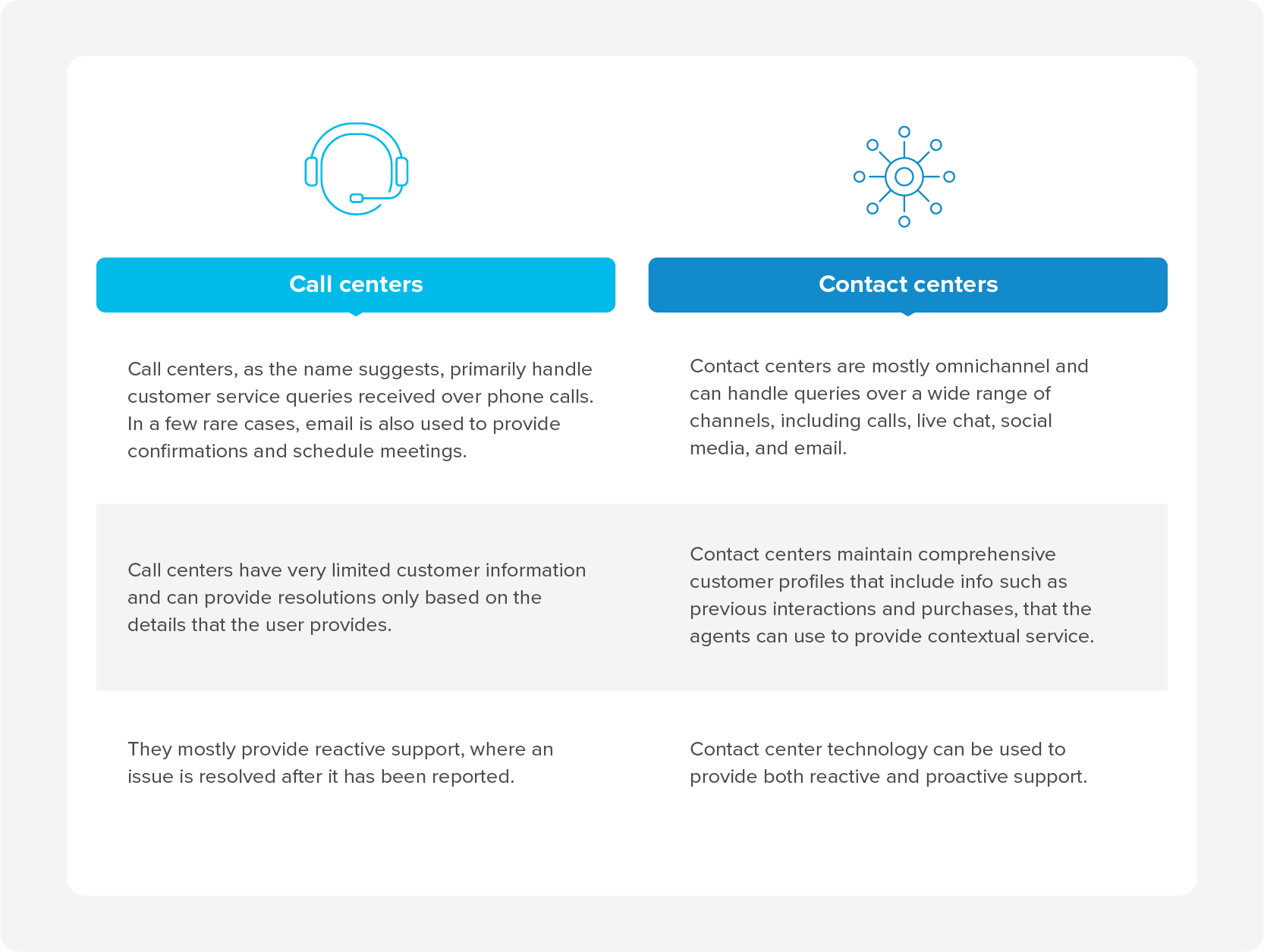- What is a contact center?
- Call center vs. contact center — what’s the difference?
- Why are different types of contact centers necessary?
- What are the different types of contact centers and which is the best for you?
- How do you choose the best contact center type for your business?
- Sprinklr Service — a Unified Customer Care Solution to address all your contact center needs
What is a contact center?
A contact center is a business division of any company that manages and resolves customer queries and issues. Contact centers usually have a preferred set of customer service channels that they cater to, and incoming tickets are usually distributed between teams or agents in order to keep the ticket queue moving. Apart from handling inbound tickets, a lot of contact centers also initiate outbound contact with customers to provide proactive support or to pitch other products and services.
Call center vs. contact center — what’s the difference?
Often, the terms “call center” and “contact center” are interchangeably used in conversations. But by definition, they are significantly different right from the channels being used to the technology and capabilities they bring along.
Here‘s a quick comparison of call center vs contact center:

Why are different types of contact centers necessary?
Before we go into detail to know about all the different types of contact centers, it is essential to understand why these types were created in the first place. Here are four key reasons why contact center types are necessary for today’s business.
Requirements might be different for each company or industry. Businesses might have entirely different styles of operation based on their domain and industry, and trying to have a single mode of contact center operations might not be the best thing for their efficiency.
Flow of business can be inward or outward. Even though the majority of tickets in a contact center are inbound, there are quite a few outbound initiatives that are recently being adopted by companies that wish to improve their customer experience. So, a contact center optimized for inbound processes might not be the best fit for any sort of outbound customer service communications.
Operational cost is an important factor in contact centers. Very few companies have succeeded in turning contact centers into revenue drivers, but with the majority of them, contact centers still cost a fortune to set up and maintain. Businesses that don’t wish to take up this cost either outsource their customer service operations or adopt a highly cost-effective solution such as Contact Center as a service (CCaaS) for their support operations.
Concerns about data security can influence decision-making. In case of industries that handle highly sensitive customer data, such as banking and finance, it is considered best to keep the data as close to the source as possible to avoid any security issues.
What are the different types of contact centers and which is the best for you?
Below are different contact center types grouped together on the basis of a few important aspects of contact center operations:
Based on call/ticket flow direction
Tickets can either be created by customers themselves, or by the contact center agents in case of proactive support. This determines whether the ticket flows “inward” or “outward” in the call center. Based on this, contact centers can be classified into three types as follows.
1. Inbound contact center
Inbound contact centers are deployed to handle customer-initiated or “inbound” support conversations across your brand’s active channels, and these are the most common type of contact centers that can be seen in action. Phone calls are still the most preferred means of communication in these centers, closely followed by email and social channels.
Who should use inbound contact centers?
If your business primarily handles only inbound support conversations and does not have a need for proactive communication, inbound contact centers can prove to be a viable contact center model.
2. Outbound contact center
Outbound contact centers are majorly used in two scenarios — one, when there is a need for customer service communications that are initiated from your company, and two, when there is a need for outgoing sales communications to promote your products/services. Apart from these, outbound contact centers are also used to reach out to users and collect feedback to improve the customer experience.
Who should use outbound contact centers?
Outbound contact centers work well for companies that initiate conversations with customers, either for sales purposes or to provide proactive support.
3. Blended contact center
As the name suggests, blended contact centers combine both the functionalities of inbound and outbound centers to provide a unified platform for all customer communications. The latest solutions in the market for blended contact centers also come with a lot of advanced features such as extensive automations and unified customer profiles, to provide a great resolution experience to both the agent and the customer.
Who should use blended contact centers?
If there is an equal need for inbound and outbound conversations with your customers, a blended contact center can be the best choice for your business.
Based on hosted location
Companies can choose to host their contact centers outside their office locations if they can’t afford to set up complex infrastructure and maintain it in their premises. Thus, depending on the location it is hosted, we can fork contact centers into two types — on-premise call centers and hosted call centers.
1. On-premise contact center
If all of your contact center infrastructure (including technology and workforce) is deployed within the premises of your company, it is referred to as an on-premise contact center. This type of contact center lets you have complete control and visibility over your customer service processes and ensure data security and integrity.
Who should use on-premise contact centers?
If data security is an important criterion for your business (for example, banking, and finance), it is best to deploy an on-premise contact center to reduce the risk of customer data exposure.
2. Hosted contact center
Hosted contact centers are basically contact centers with infrastructure that is deployed and maintained outside of your company. A contact center can be considered as “hosted” in two ways; it can either be hosted by a service provider in the case of CCaaS solutions, or it can be hosted off-site in order to reduce business costs or complexity in operations.
Who should use hosted contact centers?
If operational costs are an important factor for you, or if you’re a small/medium business that currently does not have the need for a dedicated contact center, deploying a CCaaS solution for your support team or outsourcing your customer service to a hosted contact center would work best to control costs.
Based on channel coverage
Depending on the channels you can cater to and receive messages tickets on, contact center can be classified into two major types — multichannel and omnichannel.
1. Multichannel contact center
Multichannel contact centers enable businesses to provide support over an array of customer service channels, mostly independent from each other. This kind of operation tends to create a disconnect in the customer experience since there is no unified customer view of any sort. However, some businesses still prefer to use this type of contact center as their primary mode.
Who should use multichannel contact centers?
Multichannel contact centers are mostly not preferred owing to the lack of a unified customer profile. If your business has multiple customer service teams handling each channel separately, this type of contact center might suit you best.
2. Omnichannel contact center
Being the most prevalent type of contact center in the industry now, an omnichannel contact center clearly has an advantage over most other types owing to the fact that they can collate customer conversations across all your active support channels to provide a unified view of your customer profile. Armed with this information, your agents can then provide highly personalized support that resonates with your customers.
Who should use omnichannel contact centers?
Omnichannel contact centers can be adopted by businesses in any industry or domain as long as they have the need to be active on multiple support channels and also wish to deliver a unified, consistent customer service experience.
Based on service location
Contact centers can serve customers within a specific geographic area, or can cater to tickets and calls from all around the world. Depending on the location and range that these contact centers would serve, they are categorized as domestic or international contact centers.
1. Domestic contact center
Domestic contact centers are widely used by regional businesses or the ones that operate within a specific territory, to cater to the local customers in that region. For example, a company operating in India with the need for a contact center can deploy one within the country to minimize operational costs and also deliver a friendly customer service experience with agents that can understand and converse in regional languages.
Who should use multichannel contact centers?
Domestic contact centers are best suited for small and medium businesses that have a customer base within a particular region, to run customer service operations efficiently and within a budget.
2. International contact center
As the name suggests, international contact centers are used by businesses that need to cater to customers all around the world. A business in India with customers worldwide can choose to deploy individual contact centers for domestic and international customers since their requirements and modes of operation can vary significantly, and combining them to reduce operational costs might take a toll on customer service quality.
Who should use international contact centers?
Companies that have customers worldwide can choose to deploy international contact centers for each region to deliver personalized support experiences based on the customers’ locations.
Other types of contact centers
Apart from these major categories, there are a few modes of contact center operations that are less popular but are used in specific industries and use-cases.
1. Industry-specific contact center
A conglomerate that operates across several industries can choose to have separate contact centers for each, in a concept that is termed as an industry-specific contact center. For instance, if a technology company deals with both software and hardware products, it can choose to have individual contact centers for both industries to keep these operations compartmentalized.
2. Virtual contact center
In the post-pandemic world, virtual contact center are a very common sight in the industry. They refer to the style of operations where most or all agents are working remotely from different locations, collaborating over a common contact center solution. Even though they provide the ease of working from anywhere, virtual contact centers tend to create a discontinuous experience for the agents if they are not planned and deployed well.
Also read: What are the different types of call centers?
How do you choose the best contact center type for your business?
Deciding on a contact center type for your business is not a very straightforward process, but there are a few factors that can help you zero in on an option. Here are three important questions you can ask yourself before you make a decision.
1. Is data security an important factor for my business?
The first step will be determining if you handle highly sensitive customer data. If that holds, and if you have the budget and resources to host your own contact center, an on-premise contact center would be the best option. If not, it would be wise to consider opting for a lightweight CCaaS solution or even completely outsourcing your contact center operations.
2. Is the ticket flow majorly inbound or outbound?
Analyzing your contact center’s ticket/business flow direction would help you decide if you’d want to set up an inbound (support-focused) or outbound (sales-focused) contact center. If your business has a good mix of both these activities, opting for a blended contact center would be the best choice.
3. Would I need to cater to overseas customers, or would it be only local customers?
If your business also needs to provide support to customers to locations other than where it is hosted, you might have to think about deploying international call centers at your business location or even set up “off-shore” contact centers closer to your customers’ locations. Virtual contact centers can help address this to an extent by providing the flexibility to provide support irrespective of your team’s or your customer’s locations.
Sprinklr Service — a Unified Customer Care Solution to address all your contact center needs
Sprinklr Service is built on the world’s first Unified Customer Experience Management (Unified-CXM) platform that allows you to provide unmatched levels of customer service quality that can remarkably improve your customer experience. Our powerful omnichannel contact center solution allows you to:
Streamline both your inbound and outbound customer service processes and unify all your activities into a single window for maximum visibility to agents and supervisors alike.
Analyze and understand your most frequent customer queries using our advanced AI engine, and set up automated workflows that can readily resolve these queries without agent intervention.
Help agents and support teams across the globe collaborate seamlessly on tickets and move them toward quicker resolutions.
Ensure maximum security for any and all customer data collected throughout the process, from PCI-compliant data collection forms to controlling who has access to what parts of your customer data.
Identify gaps in agent performance and suggest areas of improvement using detailed reports to increase individual productivity while also improving your team’s efficiency in the process.
Frequently Asked Questions
The most common types of contact centers are omnichannel contact centers, blended contact centers, and hosted contact centers (with CCaaS solutions).
Thank you for contacting us.
A Sprinklr representative will be in touch with you shortly.
Contact us today, and we'll create a customized proposal that addresses your unique business needs.
Request a Demo
Welcome Back,
No need to fill out any forms — you're all set.



